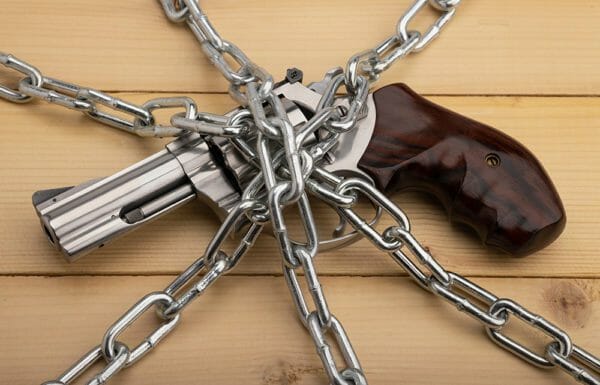
“Caribbean authorities say missing American couple is feared dead after 3 prisoners hijacked yacht,” USA Today reported Sunday. “An American couple who went missing while sailing off the coast of Granada is feared dead after their catamaran yacht was hijacked by three escaped prisoners, authorities said.”
The yacht Simplicity, “found ‘anchored and abandoned’ off a beach on the island of St. Vincent,” bore “chilling evidence of a violent struggle.” What’s not clear is what chance the couple, described by their sailing association as “veteran cruisers” who were “warm hearted and capable,” would have stood in a physical confrontation against what the Royal Grenada Police Force reveals to be three desperate, proven violent escapees, one with multiple rape, attempted rape, and indecent assault charges. They were all much younger men than the couple, he 66 and she 71, who, according to other reports, had been married 27 years.
One thing could have equalized the situation, but that’s complicated by law, which all too often gives criminals the advantage.
Thus a vessel flying the American flag (legally) in international waters may carry any firearm allowed by U.S. federal law as well as legal ammunition to go with it.
The short of it is that a vessel entering the protected waters (coast) of a nation becomes subject to the laws of that nation once it does so.
That first assertion is not quite true, as there are states with more restrictions than federal law, so it makes a big difference which port of origin you start from. And where you’re going to.
“Many countries in the Caribbean do not allow possession of firearms or ammunition unless you have a local permit and, if arrested while traveling, the United States Embassy will not be able to secure your release,” ATF warns on its “Traveling with Firearms” page.
“Do not enter Grenada with firearms or ammunition without prior express consent from the government of Grenada.”
Even if one can obtain permission, additional restrictions apply.
“A person shall not carry any firearm or ammunition in a public place unless at the time when he carries such firearm or ammunition he has about his person a licence, certificate or permit granted by the appropriate authority, authorizing him to carry such firearm or ammunition in such a place as determined by the Minister, a Firearm User’s (Special) Permit authorizing him to carry such firearm or ammunition in such place on such occasion,” the Royal Grenada Police Force declares.
The same goes for their reported port of destination, Antigua:
Do not enter Antigua and Barbuda with firearms or ammunition without prior express consent from the Antigua and Barbuda government. Penalties for possession, use, or trafficking in illegal drugs or firearms are severe. Convicted offenders can expect long jail sentences and heavy fines.
Unfortunately, a search for the keyword “firearms” on the sailing association website and an outline of topics covered in their “safety at sea” seminar show self-defense and protection against modern-day cutthroats is not something these folks have put much thought into. And that’s a shame because if you think about the discipline and dedication it takes to sail your own vessel to far-off ports, there’s probably no group better suited to ensuring their own survival when the nearest help is hours and more away.
That does not appear to be the case here, as one friend of the couple admits, “We would leave the boat for the day, and leave the door unlocked. We felt safer in a lot of the Caribbean Islands than we did in parts of the United States, and they were the same way.”
That attitude, put bluntly, is self-defeating and foolish.
“The Caribbean stands out as one of the most violent regions in the Americas, registering some of the worst murder rates,” Statista notes. “Besides violent deaths and financial crime, Caribbean states also suffer from concerning levels of property crimes, such as robberies, burglaries, and car thefts.”
We don’t know what transpired on the Simplicity from the time three desperate predators spotted her until the time they had secured her and sailed her away. Being the type of people they were said to be, the victims may have thought their attackers were in trouble and tried to help. What we do know is a couple who by all accounts were sweet and loving fell victim to brutal savagery and were unable to do anything about it — even if they put up a hell of a fight, the odds against them, without an equalizer, were too great.
Imagine seeing someone you love in mortal terror and agony and being unable to do anything about it because you can’t even help yourself. This is what the Giffords, and Bradys, and Demanding Moms of the world would have us all reduced to by force of “law.”
We can’t help these poor people. What we can do is help ourselves, to be aware of our surroundings, to be aware of the risks in places we consider traveling to, and to take necessary precautions and make preparations should those risks suddenly, and without warning, find us. That means, when we can, not just be armed but be prudent, alert, competent, and trained.
And that means equipping ourselves to fight off political predators with everything we’ve got.
About David Codrea:
David Codrea is the winner of multiple journalist awards for investigating/defending the RKBA and a long-time gun owner rights advocate who defiantly challenges the folly of citizen disarmament. He blogs at “The War on Guns: Notes from the Resistance,” is a regularly featured contributor to Firearms News, and posts on Twitter: @dcodrea and Facebook.

from https://ift.tt/LYuk8P3
via IFTTT

No comments:
Post a Comment